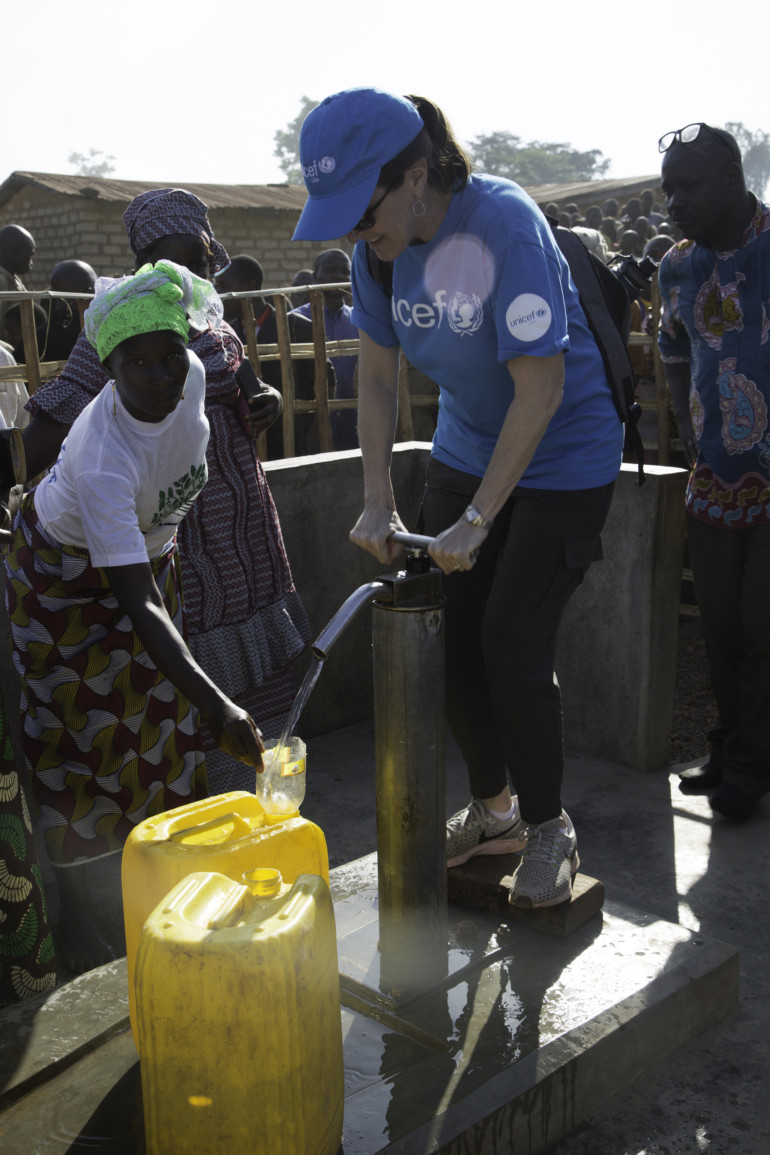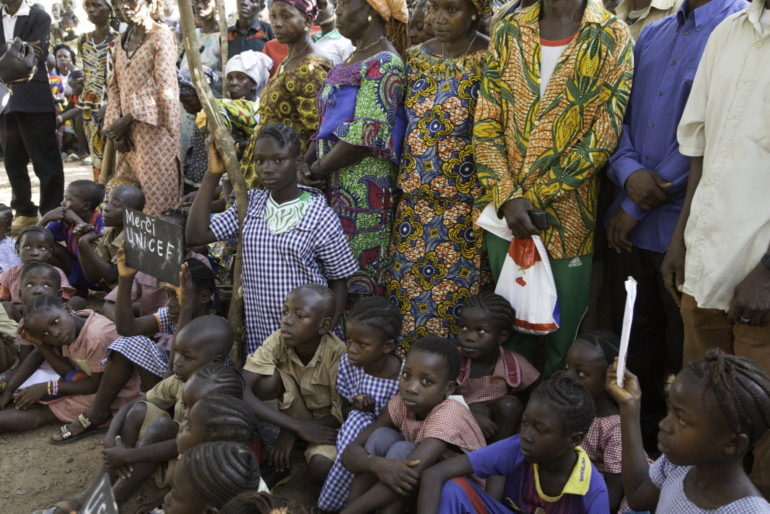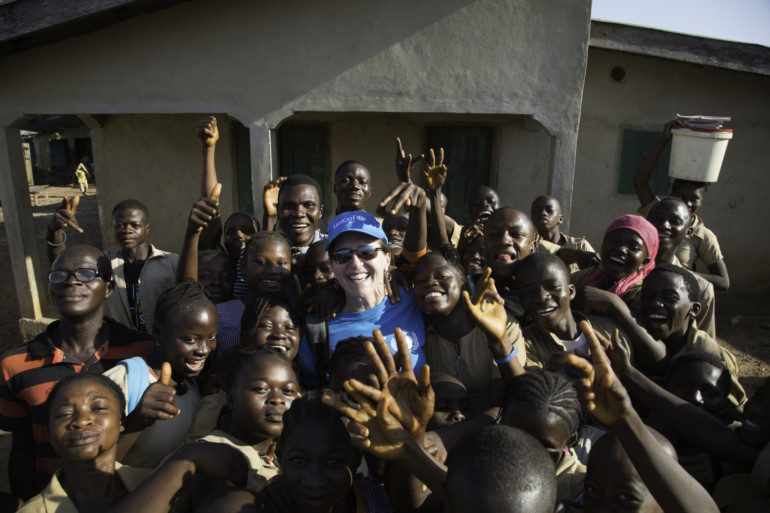Water. A basic element of life that is so often taken for granted. The running of a faucet, the quenching of thirst, the luxury of washing hands or taking a warm shower — a vital resource that some of the most vulnerable people around the world lack. Today, as safe water has proven to be the number one defense against the continued spread of COVID-19, billions of people around the world are left defenseless.
Safe water is a basic human right, yet there are nearly 4 million people in rural Guinea that do not have access to it. Glencoe native Wendy Serrino is working to change that.
In 2000, Serrino and her family set out to become involved with a philanthropic organization whose mission resonated deeply with their values and ideals. Their search led them to UNICEF — the United Nations Children’s Fund — which has helped save more children’s lives than any other humanitarian organization. An organization that is tirelessly and relentlessly working toward the day when no children die from preventable causes and every child has a safe and healthy childhood.

After 20 years of involvement with UNICEF USA, including serving as Chair of the Midwest Regional Board of Directors, Wendy’s latest endeavor, Water for Guinea, focuses on improving the quality of water and in turn, improving lives, in this West African nation. During a time where access to safe water is crucial for the world’s most vulnerable communities navigating the coronavirus pandemic, Water for Guinea serves as a beacon of hope, just as it did during the Ebola epidemic, when the initiative first launched six years ago.
In 2014 UNICEF partnered with AJA Foundation to test the feasibility of developing cost-effective water points in remote villages, Water for Guinea, by manually drilling boreholes. After the success of the pilot, AJA Foundation and Wendy teamed up to scale this initiative to serve even more rural villages. In 2018, together with UNICEF, they launched the second phase.
Local project teams (small-medium enterprises, or SMEs) use manual drilling technology to reduce the cost of water points in very rural locations otherwise unreachable by traditional machinery. The focus is to build the skills of local artisans by providing the necessary tools and training required to do this work, and in turn, strengthening Guinea’s capacity, infrastructure and economy. To date, over 125,000 people have received access to safe water and over 1,900 family members of SME employees have benefitted from the income generated from this project.
UNICEF USA’s Chicago Next Generation Chair, Iliana Alvarenga recently spoke with Serrino about Water for Guinea and her passion for the project. UNICEF Next Generation, a group of young leaders committed to supporting UNICEF’s lifesaving mission, is also working to secure the needed funding to scale Water for Guinea in two of the most rural parts of the country.
“Water for Guinea was a no-brainer. It is an easy and efficient way for the people of Guinea to gain access to safe and clean water,” remarked Serrino when asked about the “why” behind the project. “Water is vital for life. It is especially imperative given the current coronavirus pandemic and essential for handwashing techniques.”
Nearing the end of 2019, Serrino traveled to witness the program’s success firsthand in N’Zérékoré, the second-largest city in Guinea by population, where 75 percent of people there do not have access to safe water. “This was my fifth field visit with UNICEF USA and focused solely around building wells, the impact of water in villages and the differences it is making in the lives of those who it is serving,” stated Serrino.
The second phase of Water for Guinea will expand the program to build more wells, serve more villages and bring sustainable drinking water to 180,000 more people. New to this phase is the use of solar powered systems which can serve larger villages, mitigate the effects of drought or floods, and can get more faucets closer to schools, health clinics and homes. Overall, it costs just $13 to deliver safe water to a person for 10 years while $5,000 provides an entire village with water for generations.
“When you initially think of Water for Guinea, it provides access to clean water, yet the impact speaks volumes. It is also helping children to stay in school, to play and have a normal childhood where they do not have to search for water. It provides jobs, strengthens the community and therefore, has a ripple effect.”
After seeing this ripple effect, Serrino spoke about her hope for the project. “My biggest hope is that 100 percent of the people living in Guinea have access to safe water by 2030. Wouldn’t that be great? The next stage would be to have water delivered to people’s homes which will, in turn, strengthen the economy.”
As for UNICEF, Serrino shares, “I hope we continue to hammer down the child mortality rate. 15,000 children die from preventable causes every day. That number has significantly decreased in the 20 years that I have been involved with UNICEF USA. It makes me proud to be a UNICEF supporter and a tiny part of that progress.”
In closing, when asked about who inspires Serrino most, she replied, “My mother,” without hesitation. “She taught me to be a helper and be useful; I watched her do that my whole life. I like to think my lofty inspirations are Bill Gates and Warren Buffet. They are using their wealth to save the world. Gates alone has seven factories being built to help test vaccines during the coronavirus pandemic. His rigor, business sense and his ambition has changed philanthropy forever.”
Wendy is already planning to her next visit to Guinea in December 2020. This time, she plans to visit the Labé Region, the north-central part Guinea where most people do not have access to water.
Susan and Nick Noyes have pledged to match financial gifts to UNICEF’s Water for Guinea Project up to $10,000. For more information about Water for Guinea and to donate to this cause, please visit www.waterforguinea.org.

About UNICEF and UNICEF USA
The United Nations Children’s Fund (UNICEF) works in more than 190 countries and territories to put children first. UNICEF has helped save more children’s lives than any other humanitarian organization, by providing health care and immunizations, safe water and sanitation, nutrition, education, emergency relief and more. UNICEF USA supports UNICEF’s work through fundraising, advocacy and education in the United States. Together, we are working toward the day when no children die from preventable causes and every child has a safe and healthy childhood.
More from Better:


